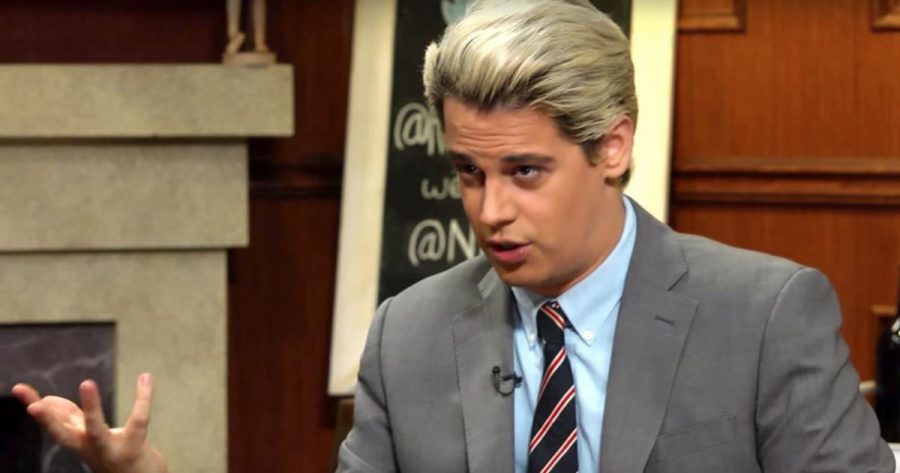Hypocrisy in the democracy
UC-Berkeley riots shine a light on larger issues of partisan bias and blind self-righteousness
More stories from Gabriel Lagarde
Photo by submitted
Protests over Milo Yiannopoulos’ invitation to speak at Berkely became violent last Thursday
Milo Yiannopoulos hasn’t been shy with his vitriol.
The Breitbart editor and conservative media provocateur’s reputation rests on his statements, which run the gambit from puzzling and self-contradicting, to xenophobic, misogynistic and reflective of a childish narcissism most commonly found on middle school playgrounds.
Perhaps the quote that best encapsulates Yiannopoulos’ inflammatory persona is “What America needs is more hate.”
But in terms of his comments following the UC-Berkeley riots that occurred Thursday — which centered around a mass protest against a speaking event Yiannopoulos was scheduled to headline and was subsequently canceled — the man was absolutely right.
Yiannopoulos described the riots as “heavily ironic,” and noted it was “self-defeating for the social justice left.”
To put it simply, what took place in California highlights the hypocrisy of the left where liberals are naïve enough to think violent bigots or authoritarianism are unique to the far-right. Or it highlights a blind, self-righteous bias among people across the spectrum who think anything is permissible, just as long as it’s in the service of their particular team.
Let’s set the record straight
In the hours following the riots, President Trump tweeted his displeasure with UC-Berkeley and threatened to cut federal funding for the university for creating an environment hostile to conservatives and its alleged backing of the riots — except that UC-Berkeley hosted Yiannopoulos’ event despite backlash from liberals, canceled the event when it became apparent things were taking a turn for the worse and publically denounced any rioters when violence broke out.
While violence is toxic to a movement and hurts its cause, it should be noted that there is a distinction between abhorrent behavior at the individual level and those of leading figures.
When Martin Luther King Jr. was assassinated in April 1968, there was a wave of riots in many cities across the nation in response to his death. Anyone with a superficial knowledge of King’s life knows he never advocated for violence. These riots were not in keeping with his vision, yet they still happened in his name, and at the same time, the Civil Rights movement was not any less vital or justified.
Who’s really at fault?
Reports that trickled out of the riots noted the gathering did indeed start as a peaceful protest but quickly turned ugly when 100-150 individuals (depending on the source) arrived dressed in black, wielding baseball bats and smoke bombs.
These individuals have been identified as “Antifas” or “anti-fascists” or a “black block.” Whatever their affiliation, they’re radical anarchists who have little in common (and according to some sources may actually disdain) the liberals who took part in the protest. They also sport a history of hijacking protests in the past and using them for their own violent dissent.
It’s difficult to determine to what extent these anarchists perpetrated the riot. Many individuals were intimidated, and some were even assaulted when they tried to record what happened. On top of that, the riots involved scores of individuals in a chaotic and dimly light environment.
That being said, it’s naïve to believe that such widespread destruction was brought about by a hundred or so anarchists. What footage is available indicates a much larger crowd, and many of them are not dressed as the anarchists were described.
It may be safe to say the original catalyst for the riots were these Antifas, but ultimately much of the blame falls on protesters.
The conclusion
While the damage of the riots cannot be undone, this presents an opportunity for the left to take a long look in the mirror. While it’s easy to demonize people of opposing political positions and treat them as a monolith, the fact of the matter is that are no monoliths. Liberals aren’t fundamentally right or good and conservatives aren’t fundamentally wrong or evil, and vice versa. We are all flawed individuals.
In fact, we cannot espouse to be a monolith unto ourselves. Anyone can be repressive and backward, or upstanding and prudent, depending on a particular issue or a particular time and a set of circumstances.
It is well documented in the case of conservatives. For the left, this was borne out during the ugliness of the 2016 election when liberals responded to the bigotry of some Trump supporters and muttered comments along the lines that they “wished they were dead” or in the numerous cases when a conservative argument is given, no matter how well-constructed, and it’s written off as “racist” or “misogynist” or worse, simply because it doesn’t feel right to liberals — never mind actually engaging the issue.
And of course, it plays out when supposedly “tolerant” liberals assault conservatives or pepper spray them simply because they expressed themselves, as it happened Feb. 2 in Berkeley, California.
If liberal principles are somehow intrinsically right, then they must win in the market of ideas, through dialogue, not censorship. Objecting to one oppression then participating in another doesn’t serve to undermine one’s cause, it proves it’s wrong.
What seems to be inability for the left to be critical of itself is only going to continue to hamstring its political efforts in the future. It’s worth reminding that, despite the supposedly repugnant positions of President Trump and his “deplorables,” conservatives control the executive branch, majorities in both the House and the Senate, 33 state governorships and, given time, the Supreme Court.
If social media is any indication, a couple weeks into the new administration and liberals think Trump’s controversial executive orders have handed them the 2020 election, just as they believed his actions would hand them the 2016 election. It seems they refuse to learn. At this rate, it can only be expected we will live under Republican leadership for years to come.

